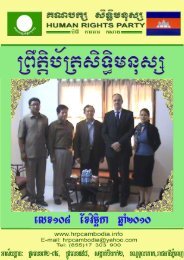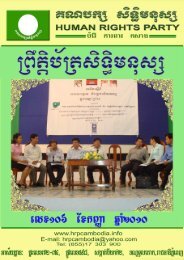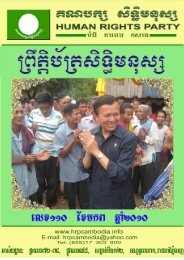Losing Ground - Human Rights Party.
Losing Ground - Human Rights Party.
Losing Ground - Human Rights Party.
Create successful ePaper yourself
Turn your PDF publications into a flip-book with our unique Google optimized e-Paper software.
<strong>Losing</strong> <strong>Ground</strong><br />
food and water,” Mr. Choeun said. “The children were crying<br />
all the time. They were hungry and thirsty. Sometimes we<br />
could carry them, other times they had to walk,” Mrs. Sarom<br />
said. “Along the way, strangers would come to us and give us<br />
food and water,” she added.<br />
Each day they started at 7am and stopped at 6pm at a pagoda,<br />
after asking district police for permission. Police - often as<br />
many as 12 officers - were sent to watch them.<br />
Attempts to stop them began after they entered Pursat<br />
“Some of us had worn out our sandals. Our<br />
feet were blistered and bleeding; even the ends<br />
of our trousers were torn and ragged”<br />
province: when their march had become national news. Two<br />
policemen told them to turn around and go home. “We said<br />
‘no’ and kept walking,” Mrs. Sarom said.<br />
Next, the deputy governor of Battambang arrived and told<br />
them that if they returned he would solve the problem.<br />
“We spoke for about 15 minutes. He said he had never<br />
heard about our problem", Mrs. Sarom said. "We didn’t<br />
believe him. We reminded him that we had protested in front<br />
of the provincial court. ‘Why didn’t you help us then?’ we<br />
asked. He did not answer this question, so we kept walking.”<br />
At a pagoda near the border between Pursat and Kampong<br />
Chhnang provinces, a Ministry of Interior official arrived to<br />
meet them, accompanied by reporters and cameramen from<br />
state-affiliated television stations. He invited five leaders,<br />
including Mrs. Sarom, to return to Battambang to find a<br />
solution. “We took the bus back to Battambang and talked<br />
with the officials. We were assisted by two lawyers from<br />
Legal Aid Cambodia (LAC), one from the province and one<br />
from Phnom Penh. [The ministry official] told us to make<br />
a new complaint to the court, but we had already done<br />
that many times. After 15 minutes we called the group and<br />
told them to keep walking. Then, we got a bus and rejoined<br />
them,” she said.<br />
They arrived on June 2 in Phnom Penh and gathered at an<br />
NGO’s headquarters to seek assistance in delivering their<br />
letter to Prime Minister Hun Sen. “Some of us had worn<br />
out our sandals. Our feet were blistered and bleeding; even<br />
the ends of our trousers were torn and ragged,” Mr. Mony<br />
recalled.<br />
They arrived at the entrance to the road leading to the<br />
prime minister's estate at about 7pm. “There were more<br />
than 200 of us. There were about 30 police officers. We<br />
delivered our complaint then slept on the other side of the<br />
road,” Mrs. Sarom said.<br />
The next morning they were surrounded by members<br />
of the Prime Minister’s bodyguard unit. “They were very<br />
aggressive", one of the villagers said. One of them hit six<br />
people on the head. They also tried to grab one boy and take<br />
him away, but women rushed in and pulled him back. The<br />
people that were hit on their heads were two women, one<br />
“We didn’t know if Hun Sen ever received our<br />
letter, so we mailed it to his office. ”<br />
over 40 and the other over 30, and four men, one in his early<br />
20s and the others in their 30s.<br />
After the police attacked the villagers, they were told to go<br />
home. "We were given a letter from the government saying<br />
an official would visit us at our village in June", Mrs. Sarom<br />
said. "They also gave us $100 for bus fare. We crowded onto<br />
one bus. We sat in our seats and in the aisle. Most of us were<br />
silent all the way back. We didn’t talk about the walk.”<br />
“We didn’t know if Hun Sen ever received our letter, so<br />
we mailed it to his office. No government official ever came<br />
to our village. If we have to, maybe we will walk again.”<br />
Forced Evictions and Intimidation in Cambodia<br />
9






